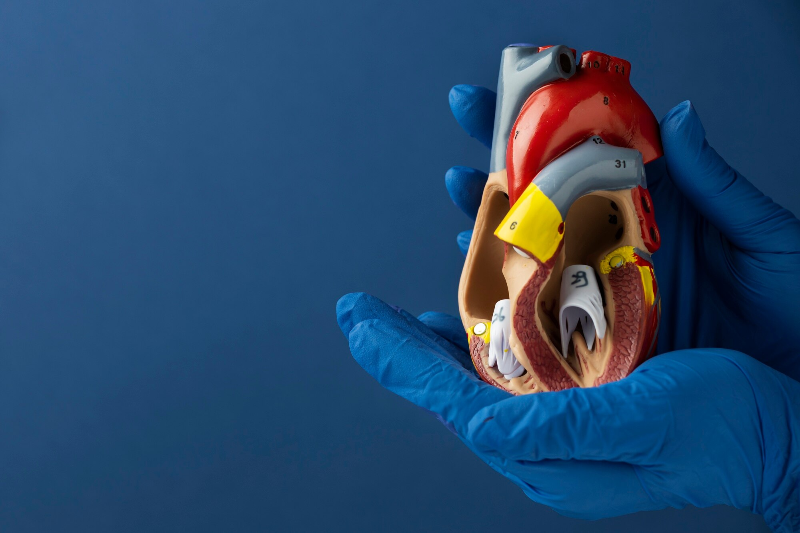By Angela Ryan Lee, MD
Medically reviewed by Yasmine S. Ali, MD, MSCI
Cardiovascular disease (CVD) is a serious condition caused by the buildup of cholesterol plaques in blood vessels (atherosclerosis), which lead to stroke, heart attack, and peripheral artery disease.
Some well-known risk factors of CVD include high blood pressure, high cholesterol, and smoking. But it's recently become understood that inflammation plays a big role in atherosclerosis as well.
This article discusses inflammation's role in heart disease and ways to combat it.
Verywell / Jessica Olah
What Is Inflammation?
Inflammation is an important part of the immune response, the body's protective mechanism against infection and injury. The immune system defends the body against pathogens like viruses, bacteria, and parasites. Various cells and proteins are involved in complex signaling pathways in the inflammatory response.
Inflammation can be acute or chronic. Acute inflammation, such as allergic reactions or responses to an infection or injury, is a vital protective mechanism. But when inflammation is chronic, as in autoimmune disease, toxin exposure, and even stress, it can create a host of problems.
People can live with chronic inflammation without even knowing it, and symptoms can be vague.
Examples of Acute Inflammation
We experience acute inflammation as a localized reaction to trauma or infection. Think of the last time you cut your finger or had a pimple. Inflammation is responsible for the resulting redness, swelling, warmth, and pain. This happens because blood vessels in the affected area dilate and become leakier. Immune cells can then come in and clear up pathogens and toxins to start the healing process.
Levels of inflammation can be measured through blood markers. General measures of overall inflammation include:
Erythrocyte sedimentation rate (ESR)
C-reactive protein (CRP)
Complement levels
More specific tests for autoantibodies can look at levels of inflammation in specific diseases. Healthcare providers can measure these to determine levels of inflammation and how well certain autoimmune diseases are controlled.
Link Between Inflammation and Heart Disease
In recent years, the role of inflammation in heart disease has been a topic of interest to scientists.
Research on inflammatory conditions has confirmed the idea that inflammation has a negative effect on blood vessels. One of the reasons for this is that inflammation causes damage to the inner lining of blood vessels, or endothelium, which increases the risk of heart attack and stroke.
Researchers are investigating the role that anti-inflammatory medications may have in preventing heart disease.
The anti-inflammatory diet is also a topic of great interest and has shown a promising link in decreased heart disease risk.
Psoriasis
Psoriasis is a skin condition that causes itchy, scaly skin patches that come and go. Some people also develop inflammation in their joints, called psoriatic arthritis. However, inflammation in psoriasis goes beyond the skin and joints.
Studies have shown that people with psoriasis have higher rates of cardiovascular disease. Inflammation in psoriasis causes insulin resistance, endothelial dysfunction, and activation of platelets, all of which contribute to heart disease.1
It remains to be seen how effective current psoriasis treatments are at lowering excess cardiovascular risk. Studies have shown that treatment of psoriasis with certain anti-inflammatory medications called TNF-alpha inhibitors are associated with lower rates of heart attack and stroke.2
Ongoing research is investigating the effect of other treatments on heart disease risk in psoriasis.
Rheumatoid Arthritis
Similar to psoriasis, rheumatoid arthritis (RA) is an autoimmune disease that causes inflammation. RA mainly affects the joints, but people with this inflammatory disease have up to twice the rates of certain forms of heart disease and stroke.3
Interestingly, the severity of rheumatoid arthritis is related to the risk of heart disease. Those with worse RA symptoms have higher rates of heart attacks and strokes than people with mild symptoms.4
Lupus
Systemic lupus erythematosis, called lupus for short, is another autoimmune condition that causes a variety of symptoms throughout the body. People with lupus may develop skin rashes, kidney problems, joint pain and swelling, and changes in blood counts.
High blood pressure, diabetes, and high cholesterol, which increase the risk of heart disease, are more common in people with lupus. But the higher risk of heart disease in lupus cannot be explained by these risk factors alone. As in psoriasis and RA, inflammation appears to be a major culprit, leading to more heart attacks, strokes, and peripheral artery disease.5
Furthermore, lupus can affect the heart valves and cause inflammation in the protective sac around the heart called the pericardium (pericarditis) and the heart muscle itself (myocarditis).
HIV
Human immunodeficiency virus (HIV) is an infection that impairs the immune system and causes chronic inflammation.
The exact cause of inflammation in HIV is unclear, but it has long been known that HIV infection results in a higher risk of heart disease. Unfortunately, even when HIV is controlled with medications that bring the viral load to undetectable levels, levels of inflammation remain higher than normal.6
In addition, medications used to treat HIV can contribute to heart disease risk. Side effects of some antiretroviral medications include high cholesterol, high blood pressure, and insulin resistance.
Other Causes of Inflammation
In addition to being triggered by autoimmune diseases and infection, chronic inflammation can have many other causes. The following have been linked to inflammation:
Chronic heavy alcohol use
Smoking
Obesity
Bisphenol A (BPA), a compound in some plastics, and other endocrine disruptors7
Air pollution
Chronic psychological stress
While some conditions cause obvious inflammation, people without a diagnosis of inflammatory disease may also have chronic inflammation without knowing it. We all come into contact with foods that cause inflammation and chemicals in plastics and the environment that researchers are now linking to endocrine disruption and inflammation.
Treatment of Inflammation
Since chronic inflammation has negative effects throughout the body, particularly for heart health, what are some ways to lower it? In people with inflammatory conditions, certain medications can help. But everyone can benefit from lifestyle changes, which can include incorporating an anti-inflammatory diet.
Medication
We know that inflammation contributes to heart disease, but the role of anti-inflammatory medications in lowering cardiovascular risk is less clear.
Compellingly, statins, the class of medications most often used for preventing heart attacks and strokes, have anti-inflammatory properties. This is one explanation for how statins can lower cardiovascular risk beyond their cholesterol-lowering effect.
Guidelines on Risk Enhancers
Guidelines from the American College of Cardiology and American Heart Association recommend that healthcare providers consider chronic inflammatory conditions like RA, lupus, and psoriasis as "risk enhancers" for cardiovascular disease. Those with these conditions have a lower threshold and should be considered for cholesterol-lowering medications (statins) to lower their risk of heart disease.8
Furthermore, some specific anti-inflammatory medications have shown promise in preventing heart disease. This is an area that researchers are investigating with the hope of improving our understanding of inflammation and CVD and potentially targeting specific inflammatory pathways to prevent heart disease.
One important study called the CANTOS trial looked at the monoclonal antibody drug called canakinumab. This medication targets a specific pathway to decrease inflammation. In people who had previously had a heart attack, canakinumab decreased the risk of a stroke or second heart attack.9
Additionally, the COLCOT trial demonstrated that low-doses of the anti-inflammatory medication colchicine given after a recent heart attack was associated with less cardiovascular events.10
Anti-inflammatory medications aren't a magic bullet for preventing heart disease, though. A study of low dose methotrexate (a drug commonly used in treatment of RA) did not show lower rates of heart attack or stroke.11
Furthermore, some commonly used treatments for inflammatory conditions actually increase heart disease risk. For example, NSAIDs like aspirin or ibuprofen can increase blood pressure. Corticosteroids, which are commonly used for treating autoimmune disease, increase blood pressure, blood sugar, and cholesterol, particularly when taken for prolonged periods.
Lifestyle Changes
Combatting inflammation can be helpful to those with autoimmune disease, but everyone can benefit from some lifestyle changes that decrease inflammation. This includes moderate exercise and an anti-inflammatory diet.
Many studies have shown that regular moderate-intensity exercise has an anti-inflammatory effect and lowers levels of CRP and other inflammatory markers.12
The American Heart Association recommends 150 minutes of moderate-intensity exercise weekly. But for those with a sedentary lifestyle, even increasing physical activity by a small amount can be beneficial.13
Anti-Inflammatory Diet for Heart Health
While some foods like red meat and refined sugars increase inflammation, other foods have the opposite effect and actually lower levels of inflammation.
Evidence from a large 2020 study demonstrated that eating a diet higher in foods that promote inflammation was associated with increased risk of heart disease.14 The study showed that anti-inflammatory foods, which are high in antioxidants, polyunsaturated fatty acids, and fiber, are more protective against heart disease.
The following foods are part of an anti-inflammatory diet, which can benefit everyone:
Fruits
Colorful vegetables (green leafy vegetables, dark yellow vegetables)
Whole grains
Polyunsaturated fatty acids (e.g., omega-3 fatty acids like in fatty fish and walnuts)
Tea, coffee, red wine (moderate amounts)
Inflammatory foods to avoid include:
Processed meat
Red meat
Organ meat
Trans fat
Refined sugars
Sweetened drinks
Excessive alcohol
Summary
Research demonstrates a link between inflammation and heart disease. People with conditions that increase inflammation have a higher risk of cardiovascular disease. Some treatments for inflammatory conditions have a beneficial effect on heart disease risk, while others may have harmful effects like increasing blood pressure, blood sugar, and cholesterol. Everyone can benefit from the anti-inflammatory effects of moderate exercise and a nutritious diet.
15 Sources
Boehncke WH. Systemic inflammation and cardiovascular comorbidity in psoriasis patients: causes and consequences. Front Immunol. 2018;9:579. doi:10.3389/fimmu.2018.00579
Cai J, Cui L, Wang Y, Li Y, Zhang X, Shi Y. Cardiometabolic comorbidities in patients with psoriasis: focusing on risk, biological therapy, and pathogenesis. Front Pharmacol. 2021;12:774808. doi:10.3389/fphar.2021.774808
Liao KP. Cardiovascular disease in patients with rheumatoid arthritis. Trends Cardiovasc Med. 2017;27(2):136-140. doi:10.1016/j.tcm.2016.07.006
Urman A, Taklalsingh N, Sorrento C, McFarlane IM. Inflammation beyond the joints: rheumatoid arthritis and cardiovascular disease. Scifed J Cardiol. 2018;2(3):1000019.
Lazou A, Ikonomidis I, Bartekova M, et al. Chronic inflammatory diseases, myocardial function and cardioprotection. Br J Pharmacol. 2020;177(23):5357-5374. doi:10.1111/bph.14975
Castillo-Mancilla JR, Phillips AN, Neaton JD, et al. Association of suboptimal antiretroviral therapy adherence with inflammation in virologically suppressed individuals enrolled in the SMART study. Open Forum Infect Dis. 2017;5(1):275. doi:10.1093/ofid/ofx275
Lee HW, Ha SK, Kim Y. Bisphenol A disrupts inflammatory responses via Nod-like receptor protein 3 pathway in macrophages. Appl Biol Chem. 2020;63:78. doi:10.1186/s13765-020-00562-6
Arnett DK, Blumenthal RS, Albert MA, et al. 2019 ACC/AHA guideline on the primary prevention of cardiovascular disease: executive summary: a report of the American College of Cardiology/American Heart Association Task Force on Clinical Practice Guidelines. Circulation. 2019;140:e563–e595. doi:10.1161/CIR.0000000000000677
Ridker PM, Everett BM, Thuren T, et al. Antiinflammatory therapy with canakinumab for atherosclerotic disease. N Engl J Med. 2017;377(12):1119-1131. doi:10.1056/NEJMoa1707914
Tardif JC, Kouz S, Waters DD, Bertrand OF, et al. Efficacy and safety of low-dose colchicine after myocardial infarction. N Engl J Med. 2019;381(26):2497-2505. doi:10.1056/NEJMoa1912388.
Ridker PM, Everett BM, Pradhan A, et al; CIRT Investigators. Low-dose methotrexate for the prevention of atherosclerotic events. N Engl J Med. 2019;380(8):752-762. doi:10.1056/NEJMoa1809798
Scheffer DDL, Latini A. Exercise-induced immune system response: Anti-inflammatory status on peripheral and central organs. Biochim Biophys Acta Mol Basis Dis. 2020;1866(10):165823. doi:10.1016/j.bbadis.2020.165823
American Heart Association. American Heart Association recommendations on physical activity in adults and kids.
Li J, Lee DH, Hu J, et al. Dietary inflammatory potential and risk of cardiovascular disease among men and women in the U.S. J Am Coll Cardiol. 2020;76(19):2181-2193. doi:10.1016/j.jacc.2020.09.535
Taqueti VR, Ridker PM. Lipid-lowering and anti-inflammatory benefits of statin therapy: more than meets the plaque. Circ Cardiovasc Imaging. 2017;10(7):e006676. doi:10.1161/CIRCIMAGING.117.006676
By Angela Ryan Lee, MD
Angela Ryan Lee, MD, is board-certified in cardiovascular diseases and internal medicine. She is a fellow of the American College of Cardiology and holds board certifications from the American Society of Nuclear Cardiology and the National Board of Echocardiography. She completed undergraduate studies at the University of Virginia with a B.S. in Biology, medical school at Jefferson Medical College, and internal medicine residency and cardiovascular diseases fellowship at the George Washington University Hospital. Her professional interests include preventive cardiology, medical journalism, and health policy.







Post comments